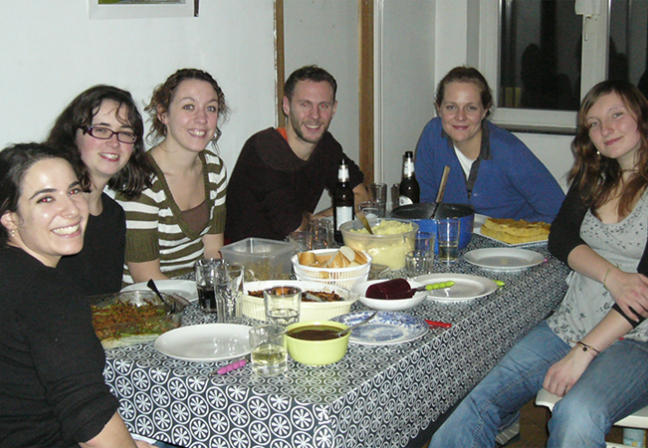Most Americans in the United States are familiar with the expression “as American as apple pie.” However, it wasn’t until I studied abroad in France (and later lived and worked in France and Belgium) that I realized just how deeply rooted pumpkin pie, and more importantly the Thanksgiving holiday, was in my American upbringing.
The first time I spent Thanksgiving away from home was in my junior year of college, when I studied in Montpellier, France, for the academic year. The program organizers hosted a “traditional” Thanksgiving dinner for the 50 or so study abroad students at a nearby restaurant. I remember it very clearly: the appetizer was a basket of plain potato chips; the French waitress paraded the cooked turkey around the room for all to see, looking incredibly proud at such an American “masterpiece;” there was a side dish of mashed potatoes; and for dessert there was the saddest, flattest piece of pumpkin pie that could only be compared to a slightly pumpkin-flavored vegetable quiche. It was a true shock to me to realize just how cultural the Thanksgiving holiday is. The French had no idea!
Four years later, I was spending my third Thanksgiving away from home in Brussels, Belgium, and I was determined to make an authentic Thanksgiving feast for my international friends and host at my apartment. I encountered two difficult challenges during my endeavor: there were a few key ingredients that I simply couldn’t find in any Belgian grocery store, and I had to work all day, so I couldn’t take the time to cook a true Thanksgiving turkey! I had to compromise a bit and cook a small turkey breast after work. I had a visiting guest bring pumpkin pie filling and canned cranberry sauce (my favorite), but I was very proud when I tracked down yams in a predominantly African neighborhood in Brussels. My Thanksgiving party was complete with Thanksgiving trivia and a short rendition of the Thanksgiving story. Again, I was surprised by how little my international friends knew of this history, but of course they didn’t study the complete history of my country in their school curriculum!
Both of these cases were learning experiences for me. It’s fun to compare holiday traditions among different countries and cultures, but when you’re living in a country that doesn’t celebrate a holiday that’s important to you, it can be tough! Sitting in my office that Thanksgiving day in Brussels, I wanted to share my holiday spirit with my coworkers. But to them, it was just business as usual on that ordinary Thursday in November. On the other hand, I was happy to whole-heartedly participate in Belgian and French holidays and traditions that were new to me. My advice to others in similar situations would be to foster curiosity and celebrate others’ traditions when immersed in another culture — and be sure to share your own culture and traditions whenever possible! What holidays or traditions might your family take for granted that are foreign to the people you’ll meet abroad?
Let us assist in planning your next immersion experience and help make it accessible to all of your students! We have many destination options for Language Immersion programs worldwide. Necessary traveler protections for teachers and students are already integrated into our programs too! Contact us today!

